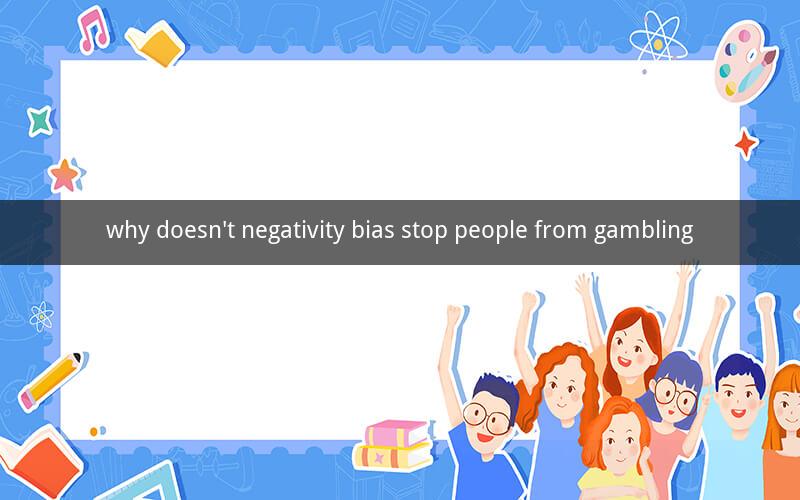
Understanding the Persistence of Negativity Bias in Gamblers
Table of Contents
1. Introduction to Negativity Bias
2. The Role of Negativity Bias in Decision Making
3. Gamblers and Negativity Bias
4. The Impact of Negative Experiences on Gamblers
5. The Role of Dopamine in Gamblers' Behavior
6. Coping Mechanisms and Negative Emotions
7. The Social Aspect of Gambling and Negativity Bias
8. The Importance of Cognitive Behavioral Therapy
9. Conclusion
10. Frequently Asked Questions
1. Introduction to Negativity Bias
Negativity bias, also known as the negativity effect, is a cognitive phenomenon where individuals tend to pay more attention to negative information or experiences than to positive ones. This bias is thought to have evolved as a survival mechanism, as it helps us to anticipate and avoid potential threats in the environment.
2. The Role of Negativity Bias in Decision Making
In decision-making processes, negativity bias can lead individuals to focus on the potential negative outcomes of a decision rather than the positive ones. This can result in risk-averse behavior, where individuals prefer to avoid potential losses rather than pursue potential gains.
3. Gamblers and Negativity Bias
Gambling involves taking risks and facing potential losses. Individuals who engage in gambling may exhibit a stronger negativity bias, as they are more attuned to the potential negative consequences of their actions. This can make it difficult for them to stop gambling, even when they are aware of the negative impact it has on their lives.
4. The Impact of Negative Experiences on Gamblers
Negative experiences, such as financial losses or negative social consequences, can reinforce the negativity bias in gamblers. These experiences can create a cycle of negative reinforcement, where gamblers feel compelled to continue gambling in the hope of reversing their losses.
5. The Role of Dopamine in Gamblers' Behavior
Dopamine, a neurotransmitter associated with pleasure and reward, plays a crucial role in gamblers' behavior. The anticipation of winning and the release of dopamine can create a sense of euphoria, which can reinforce the behavior of gambling. However, the negative consequences of gambling can also lead to the release of stress hormones, further exacerbating the negativity bias.
6. Coping Mechanisms and Negative Emotions
Gamblers often use gambling as a coping mechanism to deal with negative emotions such as anxiety, depression, or boredom. The temporary relief from these emotions provided by gambling can reinforce the behavior, despite the negative long-term consequences.
7. The Social Aspect of Gambling and Negativity Bias
The social aspect of gambling, such as the camaraderie and excitement of playing with others, can also contribute to the persistence of negativity bias. Gamblers may feel compelled to continue gambling to maintain their social connections or to experience the thrill of the game.
8. The Importance of Cognitive Behavioral Therapy
Cognitive Behavioral Therapy (CBT) has been shown to be effective in treating gambling addiction. CBT helps individuals to recognize and challenge negative thoughts and behaviors, replacing them with more positive and adaptive ones. By addressing the underlying causes of the negativity bias, CBT can help gamblers to break the cycle of gambling and its negative consequences.
9. Conclusion
The persistence of negativity bias in gamblers is a complex issue with multiple contributing factors. Understanding the role of this bias can help in developing more effective interventions and support systems for individuals struggling with gambling addiction.
Frequently Asked Questions
1. What is negativity bias?
- Negativity bias is a cognitive phenomenon where individuals pay more attention to negative information or experiences than to positive ones.
2. Why does negativity bias affect gamblers?
- Gamblers may exhibit a stronger negativity bias due to the potential negative consequences of their actions and the reinforcing effect of negative experiences.
3. How does dopamine contribute to gambling behavior?
- Dopamine is associated with pleasure and reward, and its release during the anticipation of winning can reinforce gambling behavior.
4. What are coping mechanisms for negative emotions?
- Coping mechanisms can include using gambling as a way to distract from or alleviate negative emotions, such as anxiety or depression.
5. How can social aspects contribute to gambling addiction?
- Social aspects, such as camaraderie and excitement, can reinforce gambling behavior and make it more difficult to stop.
6. What is Cognitive Behavioral Therapy (CBT)?
- CBT is a form of therapy that helps individuals recognize and challenge negative thoughts and behaviors, replacing them with more positive and adaptive ones.
7. How effective is CBT for treating gambling addiction?
- CBT has been shown to be effective in treating gambling addiction by addressing the underlying causes of the behavior.
8. What are some long-term consequences of gambling addiction?
- Long-term consequences can include financial ruin, relationship problems, and mental health issues.
9. Can negativity bias be changed?
- While it can be challenging, negativity bias can be changed through interventions such as therapy and self-reflection.
10. Are there any support groups for gamblers?
- Yes, there are various support groups available for individuals struggling with gambling addiction, such as Gamblers Anonymous and Gam-Anon.